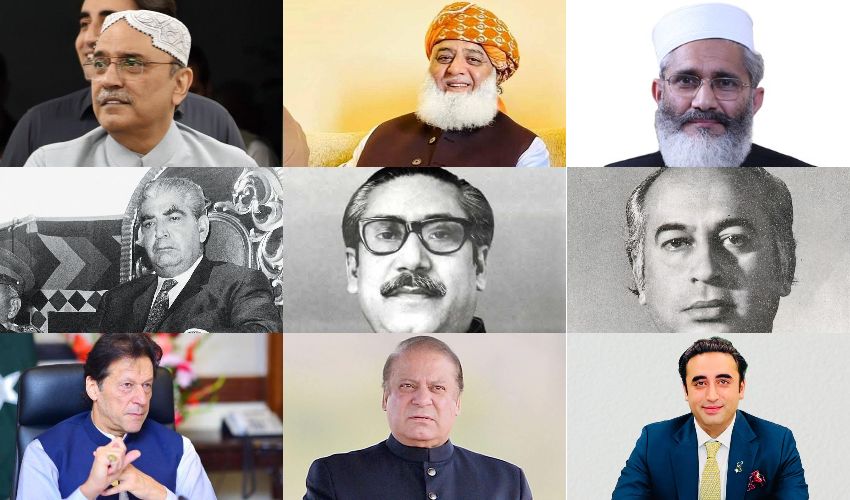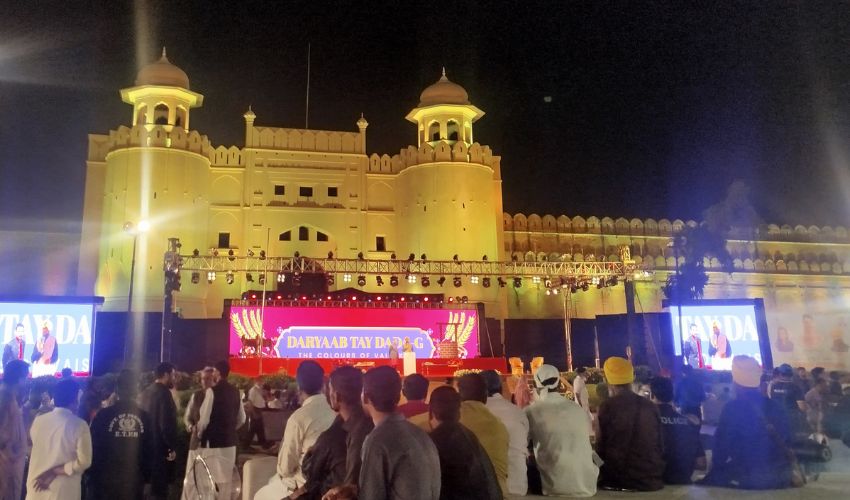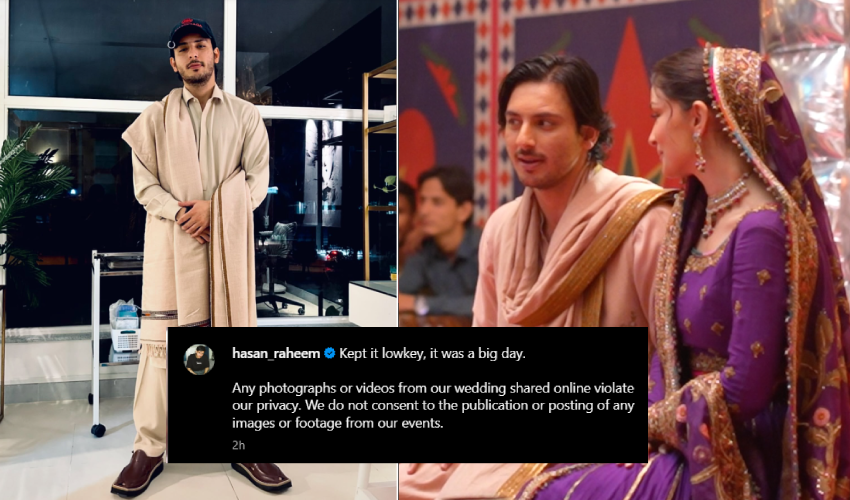Even though the result of the 1970 general elections resulted in the split of the country, up until now, nobody has raised concerns about the transparency of these elections.
There is a general perception that these elections were the most transparent of all the elections that have happened so far in the country’s history.
Consequently, up until now, in the country, 11 elections have happened so far. But in each election, the political parties hurled allegations at each other of rigging.
Recalling the 1970 general elections during the current political landscape is important because one political party believes that efforts are underway to debar it from politics.
– One-person-one-vote principle –
Following Gen Ayub’s resignation, when Yahya Khan came into power, he imposed martial law in the country. After eight months, while addressing the nation on November 28, he issued the Legal Framework Order (LFO), a presidential decree, according to which it was announced for the first time in the country’s history to hold elections on the basis of the one-person, one-vote principle on October 5, 1970, while dissolving the One Unit.
Yahya said: “The New National Assembly’s primary responsibility would be to create a new constitution for the state of Pakistan within 120 days. The new polls would be held if the assembly failed to fulfil its responsibility within 120 days.”
In connection with the approved constitution, he pointed out that this devolution of power to the provinces would also underscore a resilient federation. While granting conditional approval for political activities starting on January 1, he stressed that no political party would be permitted to undermine the principles, integrity, and survival of Pakistan.
Efforts to influence elections through wealth and coercion will be thwarted. Assurance of press freedom will be guaranteed, and any interference in the conduct of general elections will not be tolerated under any circumstances.
According to Yehya Khan's legal framework order, the National Assembly will comprise 313 members, with 300 general seats and 13 reserved for women. Among these, 162 general seats and seven for women are designated for East Pakistan.
Punjab will be allocated 82 general seats and three for women; Sindh will have 27 general seats and one for a woman; the Frontier will have 18 general seats and one for a woman, and Balochistan will have four general seats and one for a woman. Tribal areas will have seven general seats.
– Six-point agenda –
In several aspects, concerns were raised regarding the integrity of Pakistan. One proposition suggested that the federal government should only wield authority over defence and foreign affairs, accompanied by distinct financial systems for each region. A critical condition for shared capital was that funds from one region must not be transferable to the other.
States were encouraged to establish paramilitary or regional military forces. These measures, if implemented, could have preserved the unity of Pakistan's federation.
As the electoral campaign commenced on January 1st, 24 political parties joined the competition. Surprisingly, Bhutto gained significant popularity in Western Pakistan, whereas in Eastern Pakistan, Sheikh Mujib garnered widespread acceptance.
Sheikh Mujib fielded seven candidates in all constituencies of Western Pakistan, whereas Bhutto failed to find a single candidate in Eastern Pakistan. Bhutto's campaign focused on socialist reforms, opposition to the United States, and fostering friendship with China. In contrast, Sheikh Mujib concentrated on asserting autonomy for Western Pakistan.
Mujib's influence in Eastern Pakistan led to violent clashes against the Muslim League and Jamaat-e-Islami workers in Dhaka. The election results, in this charged environment, were somewhat predictable.
Sheikh Mujib secured 151 out of 162 seats in Eastern Pakistan, and the remaining 10 seats had their elections postponed due to the turmoil caused by a storm. Subsequently, when elections were held for these seats, all nine also went in Sheikh Mujib's favour.
In western Pakistan, Bhutto won 81 out of 138 general seats. In the post-National Assembly elections, during the voting for provincial assemblies on December 17, Mujib's Awami League dominated, securing 266 out of 279 seats in the Provincial Assembly of Eastern Pakistan.
– Political crisis ensued –
After the partition mandate, a political crisis unfolded in the region. Despite the Awami League emerging as a major party in the election results, the real issue arose when it became apparent that neither Sheikh Mujib nor Bhutto held a mandate on both sides. Consequently, a deadlock in government formation became inevitable.
Sheikh Mujib was eager to promptly convene the National Assembly session, while Bhutto aimed to secure assurances, particularly from Sheikh Mujib, regarding the six points related to the autonomy of West Pakistan before the assembly. However, as each day passed, Sheikh Mujib's stance hardened, asserting that the new constitution of Pakistan would be crafted in light of the mandate given by the people.
Not only did he remain steadfast on this, but he also gained approval from the parliamentary committee of the People's League on February 27, 1971, for the proposed constitutional measures. These measures included suggesting the names of East Pakistan as Bangladesh and Pashtunistan for the border region, proposing separate fiscal frameworks for both regions, and acquiring the authority for revenue collection independently from the centre, all while addressing foreign affairs and defence centrally.
This proposal heightened tensions, leading Bhutto to announce that the leader of his party would participate in the National Assembly session in Dhaka on March 1, breaking the rigidity of the situation.
In response, General Yahya intervened under pressure and dissolved the National Assembly, triggering widespread protests in Dhaka from March 1 to March 3, resulting in the imposition of a curfew. Sheikh Mujib declared civil disobedience, and what followed thereafter is a significant chapter in history.
– What caused the country to break –
Many analysts frequently argue that the 1970 elections marked the pinnacle of transparency in Pakistan's history. However, the crux of the issue may not have rested solely on the transparency of the electoral process. Rather, it hinged on the overwhelming influence of an individual who commanded a substantial number of votes in East Pakistan.
Prior to this, President Ayub refrained from direct participation in the presidential elections. Instead, he garnered 95.6 per cent of the votes through B.D. members, effectively declaring himself the elected president.
In East Pakistan, the leadership had long harboured grievances about their economic and political exploitation within this system. Consequently, when President Yahya introduced the "One Unit" policy, there was a prevailing anticipation that the outcomes might not align with their expectations.
Renowned legal expert Hamid Khan posited in his book "Constitutional and Political History of Pakistan" that in 1955, while there were objections to the unpopular move towards One Unit by the Governor-General, the other constitutional assembly deemed it a constitutional measure and incorporated it into the 1956 Constitution of Pakistan. General Yahya Khan, with his transitory role, could not reverse this decision.
Dr Rasul Bakhsh, a distinguished political expert and head, asserted that the electoral results of 1970 were crystal clear but might not have matched the expectations of the elite class.
General Yahya was informed that no party would secure a majority, thus posing no threat to his authority due to a divided mandate. Although Sheikh Mujib was popular in East Pakistan, no one foresaw the extent of the Clean Sweep.
– Comparison between PTI founder and Sheikh Mujib –
As Pakistan braces itself for the upcoming elections, a palpable sense of discord permeates the political landscape. Yet, amidst this turbulence, none of the political factions articulates a vision as distinctive as the once-prominent Awami League led by Sheikh Mujib.
Undeniably, no single political party commands universal appeal across all four provinces. Punjab, which houses 53 per cent of the nation's population, exerts considerable influence with 141 out of 266 seats in the National Assembly. Consequently, political sway in Islamabad is intricately tied to popularity in Punjab.
Once considered the stronghold of the Pakistan Muslim League-Nawaz (PML-N), Punjab now displays fractures, with whispers of the PTI making inroads into this bastion.
Nawaz Sharif, a thrice-elected Prime Minister, faced premature termination due to clashes with the influential elite. Where Sharif once stood tall, today the PTI founder occupies a similar echelon.
Accused in the May 9 vandalism, the PTI founder, however, lacks the ideological fervour and manifesto synonymous with Sheikh Mujib. Despite this, some assert that the elite is endeavouring to project Imran Khan as the contemporary Sheikh Mujib.
Dr Rasul Bakhsh said: "There is no theoretical resemblance between the PTI founder and Sheikh Mujib. Their popularity does not align, and the impending election results may heighten tensions, but Pakistan's unity is not under immediate threat."
Renowned scholar in Pakistan Studies, Dr Syed Jafar Ahmed, observed, "The 1970 elections were transparent, devoid of administrative interference. However, sections of the elite supported Jamaat-e-Islami and the Council Muslim League."
Dr Syed Jafar Ahmed underscores, "Comparing the Pakistan Tehreek-e-Insaf (PTI) Sheikh Mujib is unfounded. Despite PTI's polarisation in Pakistani politics, the party [PTI] lacks a cohesive political ideology. Its focus revolves around a cult of personality, viewing the PTI founder as the solitary problem solver, reminiscent of wrestling matches in Gujranwala where the victor earned the title of "Rustum-e-Zaman".
"In a parallel manner, PTI adherents are led to believe that the PTI founder is their savior. Nevertheless, it is imperative to acknowledge that the PTI founder is not Sheikh Mujib, and PTI is not the Awami League."



























